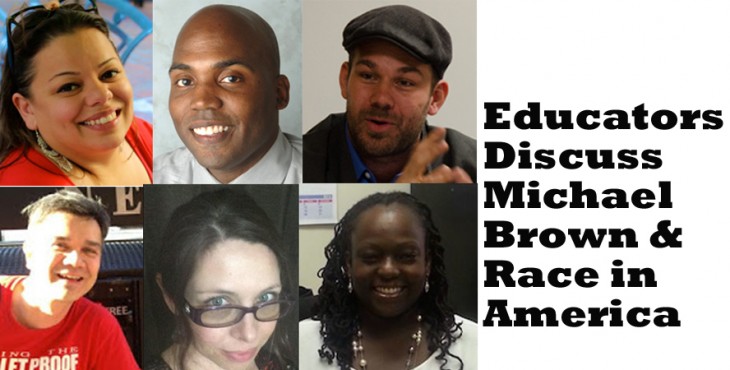By Lucianna Sanson.
1. In terms of a response to the Michael Brown shooting, what is our responsibility as educators and citizens who care about social justice?
Our response as educators should be to speak up about these issues and raise awareness about the institution of racism in America. White people, especially, should be educated about racism and prejudice and privilege in America. Until we learn to have open and safe dialogue about these issues in America, we won’t grow as a society. The institution of racism will continue to permeate our culture and paternalistic white supremacy will continue to dominate our society. America claims to have equality and justice for ALL people but OUR actions as a Nation do not back up OUR words. I feel we must all accept responsibility for our culture and society- especially white people who are, by color of skin, the privileged group of people in America. Until this fear of losing “white culture” is eradicated, racism will not die. It must die.
2. What are some productive ways to initiate and engage in dialogue with others on issues of racism?
I think that the first thing to do, especially if you are white, like I am, is to educate yourself on what racism is, and what it isn’t. Become familiar with the history of racism in America, the Jim Crow era, the civil rights movement, and the new Jim Crow era that we are currently experiencing. Read as many diverse sources as you can find- especially sources by African Americans and other People of Color. It is incredibly important to listen to what POC have to say. They are the ones who can teach the rest of us about the realities of racism. Also, If you aren’t sure about something, ask someone to educate you on the subject.
For example, I am from the South, from Tennessee, and until this past year, I had never heard the terminology “white privilege” or “people of color.” So, I asked an African American friend to educate me on the new terminology.
I said, “I am unfamiliar with some of the terminology I have read regarding race in America. Will you please educate me on what is meant by “white privilege” and “people of color?”
My friend chuckled and told me that he still preferred to be called Black, or African American and that privilege is something you are born with and is based on many things: skin color, socio-economic factors, education, ect. He said that as far as white privilege is concerned, folks in America who are born white are born with privilege that People of Color do not have in our racist patriarchal society.
So, for me, this year has been about learning new terminology to discuss racism and privilege in our society. For me, this was a learning curve, as I have always spoken out against the institution of racism, but had no idea that there was new terminology until I started listening and reading materials being published by current experts in the field, like Dr. Yohuru Williams, Dr. Denisha Jones, and Dr. Mark Naison.
3. What are some pitfalls to avoid?
For me, personally, the biggest pitfall to avoid in the race discussion is to NOT discuss the issues. These are sensitive and complex issues and because of this, many people, particularly white people, tend to not want to discuss them because it makes us, as white people, very uncomfortable. If we can move past the discomfort, if we can listen and not be defensive, or guilt ridden, we, as white folks, can help our fellow POC in America and begin to dismantle the institution of racism in this country.
4. Where can these dialogues lead us?
If we expose the boil of institutional of racism, lance it, let it drain out, clean the wound, and tend it with love and compassion, we can begin to heal as a nation. However, if we ignore the boil, cover it up in shame, refuse to lance it or expose it to fresh air, we ensure the continuous infection. In my opinion, it is our responsibility, particularly on the shoulders of white privileged people, to speak out and help encourage healing dialogue and promote tolerance and understanding. It is my duty as a parent, teacher, and American citizen, to help my country, and the children who are born here, pursue the true American Dream: life, liberty, happiness, and justice for ALL.
Lucianna Sanson teaches honors English IV/ British Literature and AP Literature at Franklin County High School in Winchester, TN. She is an administrator for the National BadAss Teachers Association.and an administrator for TNBATs. She is also the local union president for Franklin County Education Association and a member of Delta Kappa Gamma sorority for educators.





Leave a Reply